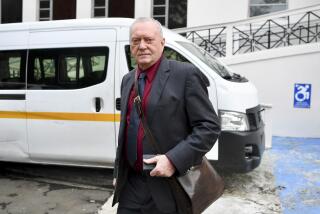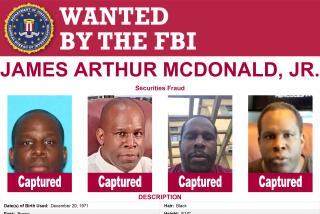Benevolence and Swindling Described : Millionaire Developer Had Two Sides
GALVESTON, Tex. â To passers-by along historic Strand Avenue, the buildings of Old Galveston Square look like any of the other 19th-Century structures restored a few years ago to boost this island cityâs tourism appeal. And yet the windows are dusty, the suites empty, the project unfinished.
J. R. McConnell was here.
Graffiti on a wall of one of the millionaire developerâs empty buildings reflect the conflicting legacy he left when he electrocuted himself in jail in July at age 41 while awaiting trial on charges of fraud and embezzlement.
âIn memory of J. R.,â the scrawled words say. âTime was too short. Galveston loves you.â
McConnellâs penchant for extravagance shows in Old Galveston Squareâs iron statues, its marble and brass and the huge, sculptured trumpet that greeted guests at the 1984 Worldâs Fair in New Orleans.
McConnell seemed to be everywhere on this island during those glory years of the oil boom, when money was plentiful.
He had arrived in Houston in 1979, towing a World War II surplus trailer behind an old Camaro because, he liked to say, âI couldnât afford a U-Haul.â
In half a dozen years he built a multimillion-dollar development empire that included 120 companies and hundreds of apartments, shopping centers and office buildings in Houston, Galveston and elsewhere.
Then the empire crashed like the price of West Texas crude.
McConnellâs bankruptcy in 1986 left behind scores of investors who lost their life savings by gambling on his promises and believing in his benevolence--a publicized willingness to underwrite civic projects that may have contributed to his downfall.
âHe was clearly a very complex character and clearly very competent at some things, including the ability to sell the same pieces of property over and over,â said H. L. (Shrub) Kempner Jr., a Galveston banker and financial consultant.
âBut he was unusual compared to a lot of the âschemeâ guys in that he actually tried to build up some quality projects at the same time he bilked people out of their money.â
McConnell placed ads in newspapers promising high returns to investors, a pledge he kept for a while. As his finances eroded, he could keep the promise no longer but still tried.
He signed bank notes giving him access to millions of dollars, officials said, but left loan officers around the country holding identical liens.
Symbolizing the financial and legal mess was the shell of a condominium-hotel, part of a 440-acre project that McConnell called Grand Beach, which stood rotting in the Gulf breeze until a fire destroyed it in October.
Authorities quickly labeled the fire arson, and the list of suspects, Fire Department investigator Rusty Kattner said, runs as long as the list of creditors.
It was another McConnell who inspired the mournful graffiti--the McConnell who completed other projects with a flourish, the millionaire developer who worked closely with preservationists to rebuild a historic city and boost tourism.
While acknowledging âthe majority opinion . . . that he did many things illegally,â Peter Brink, director of the Galveston Historical Foundation, said of McConnell: âI still have a certain affection for him.
âIn the end I think he believed he could pull it off and make it work. I donât think he was out to swindle a lot of people out of their money.â
Many disagree.
âHe was a crook and a scam man--thatâs all,â said Galveston electrical contractor Frank Norris, who said he was forced into bankruptcy after McConnell failed to pay him $170,000.
McConnell was known for working 16-hour days and involving himself in every aspect of his real estate projects, right down to his own inspections of the plumbing and electrical systems.
Once, facing a deadline for completion of a project, he bet a work crew $10,000 that it could not finish in time, then showed up with a briefcase full of cash and honored the debt, said Don Hubbel, a former city councilman who worked two years as a top McConnell assistant in Galveston before the bankruptcy filing. âHe really knew how to do things,â he said.
More to Read
Sign up for Essential California
The most important California stories and recommendations in your inbox every morning.
You may occasionally receive promotional content from the Los Angeles Times.










